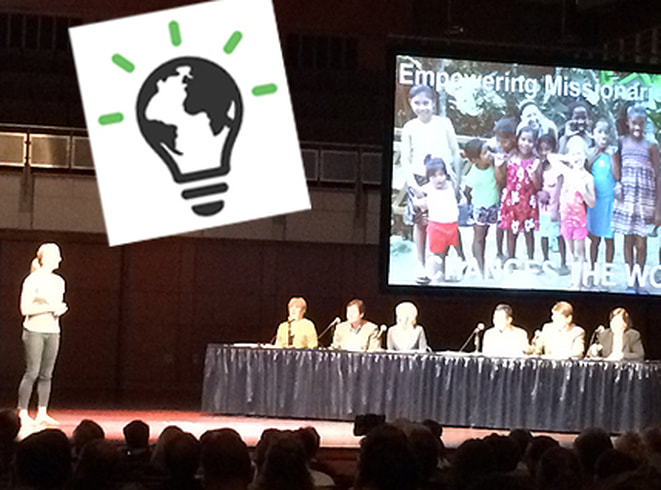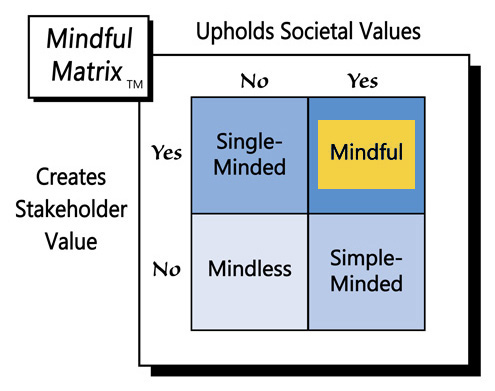For people looking for something to criticize, business can be an easy target. First, it’s ubiquitous—there are companies all around us that we work for and buy from. Second, like all individuals and organizations, businesses sometimes make mistakes.
That said, business is one of the best things most countries and communities have going for them. Businesses supply much needed products, provide critical employment, and pay valuable taxes, among other important outcomes. Without businesses, our lives would be much more challenging. Take a moment to look around you—the technology you’re using, the food you’re eating, the clothes you’re wearing are all made possible by hundreds of businesses working together to satisfy your needs.
Business certainly is a huge force behind our fruitful existence, but is that enough? Many would say, “Yes,” which is an argument that’s hard to refute for the reasons referenced above. At the same time, every area of life has its overachievers, people who aren’t satisfied with standard measures of success but who push themselves to do better and accomplish more. In a business context those overachievers are social entrepreneurs.
What is social entrepreneurship? It’s “developing innovative business models that blend traditional capitalism with solutions that address the long-term needs of our planet.” In other words, social enterprises not only satisfy their own economic goals and the needs of their main stakeholders (customers, employees, owners), they also intentionally take-on at least one pressing societal need, e.g., poverty, environmental sustainability, health, education, etc.
One well-known social enterprise is Toms, which helps a person in need, for every product purchased. Toms’ “One for One” model started by just giving shoes, but the company has since extended its benevolence to improving eyesight, ensuring safe childbirth, providing clean water, and battling bullying.
Another firm with a fully integrated social mission is Revolution Foods, which aims “to build lifelong healthy eaters by making kid-inspired, chef-crafted® food accessible to all.” Recognizing the epidemics of obesity and poor nutrition that plague our youth, Revolution Foods has developed a profit-based business model to attack these challenges head-on, providing children in schools in over 15 states with food that’s both delicious and nutritious.
When we hear of examples like Toms and Revolution Foods, it’s easy to think that such social responsibility is out of reach for most entrepreneurs; however, hundreds of people recently saw that belief battered. It happened on the campus of Messiah College, near Harrisburg, PA, during the school’s second annual Impact Venture Challenge (IVC).
The IVC is a year-long competition in which teams of budding entrepreneurs develop business plans under the tutelage of expert mentors. Eventually the six top teams compete in a culminating event that somewhat resembles ABC’s Shark Tank. A panel of judges and an energetic audience hear the teams’ final pitches and together vote to determine the first ($5,000), second ($3,000), and third ($2,000) place winners.
The IVC differs from Shark Tank in many ways, but one of the biggest distinctions is that all IVC competitors are social enterprises. Like the founders of Toms and Revolution Foods, these young entrepreneurs have developed business plans that simultaneously target both commercial and community goals. All of the finalists from this year's competition were fabulous, but here are the top three teams:
1. Accounting Beyond Borders: It’s a nonprofit organization (in formation) that serves the accounting and business needs of missionaries and mission organizations in Panama and other parts of the world, allowing those individuals and organizations to focus their energy on their primary callings.
2. Sapwood: This fledgling company has develop a unique, all natural air freshener that improves the aroma of automobiles without the potentially hazardous chemicals found in most store bought air fresheners, thus eliminating negative impacts to health and the environment.
3. Omega Swap: This company decreases college campuses’ carbon footprints and consumerism by bringing together students who want to buy and sell goods that otherwise might end up in dumpsters and landfills.
Like other social entrepreneurs, the IVC students "are individuals with innovative solutions to society’s most pressing social problems. They are ambitious and persistent, tackling major social issues and offering new ideas for wide-scale change." In short, they’re not satisfied to simply serve themselves and a few specific stakeholder groups; rather, they want to accomplish a greater good and in one way change the world.
Social enterprises with viable business plans typically include effective marketing that creates stakeholder value. Such organizations also tend to embrace standards that naturally uphold societal values like fairness and respect. Together these two criteria equate to “Mindful Marketing.” However, social entrepreneurship's intentionally broader impact for good suggests that an even higher category may be needed, perhaps one we should call “More Mindful Marketing.”
Learn more about the Mindful Matrix and Mindful Meter.
Check out Mindful Marketing Ads and Vote your Mind!




 RSS Feed
RSS Feed